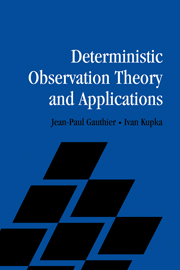8 - Applications
Published online by Cambridge University Press: 14 August 2009
Summary
In this chapter, to illustrate the theoretical content of this book we will briefly present and comment on two applications of our theory to the real world of chemical engineering. The first application was really applied in practice. The second was done in simulation only.
Binary Distillation Columns
Distillation columns are generic objects in the petroleum industry, and more generally, in chemical engineering. Here we limit ourselves to the case of binary distillation columns, i.e., distillation columns treating a mixture of two components. The example we consider in practice is a “depropanizer” column, i.e., a column distillating a mixture of butane and propane. There is at least one of these columns in each petroleum refinery. This work has been also generalized to some cases of multicomponent (nonbinary) distillation, but this topic will not be discussed here. For more details on this application, the reader should consult [64].
Presentation of a Distillation Column, the Problems, and the Equations
Binary Distillation Columns
The column is represented in Figure 1. It is composed of a certain number of trays (n), a top condenser and a boiler. The top condenser is considered as the tray 1, and the bottom of the column is considered as the tray n. In practice, n is approximately 20.
The feed (here, the butane-propane mixture) enters the column at a medium tray (the fth one, f ≅ 10). The light component (propane) is expected to be extracted at the top of the column (distillate).
- Type
- Chapter
- Information
- Deterministic Observation Theory and Applications , pp. 143 - 178Publisher: Cambridge University PressPrint publication year: 2001



